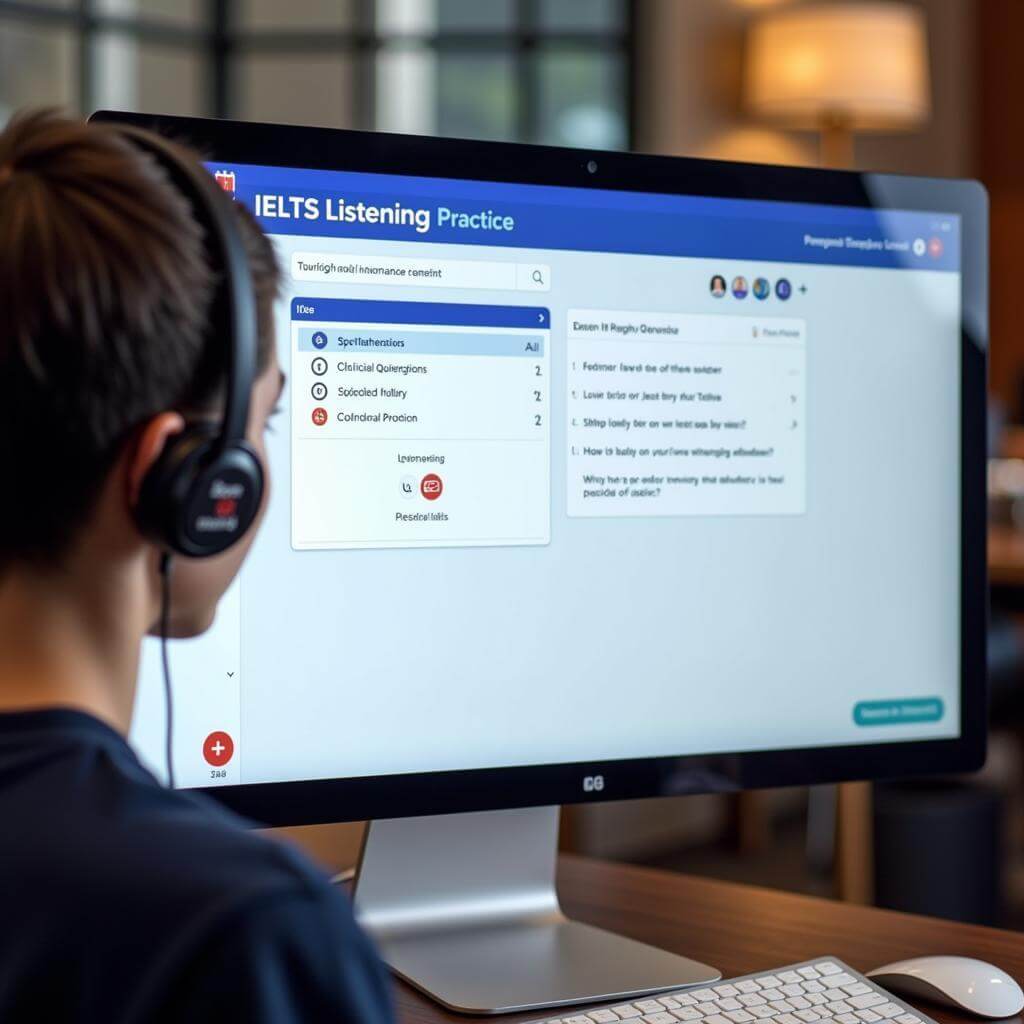Are you preparing for the IELTS listening test and looking for ways to enhance your skills? Incorporating online resources into your study routine can significantly boost your performance. As an experienced IELTS instructor, I’ll share valuable insights on using online resources for listening practice effectively.
The Power of Online Resources for IELTS Listening
In today’s digital age, how to use online tools to practice IELTS listening has become increasingly important. Online resources offer a wealth of opportunities to improve your listening skills, providing access to diverse accents, topics, and question types.
Why Online Resources Are Essential
- Accessibility: Practice anytime, anywhere
- Variety: Expose yourself to different accents and topics
- Immediate feedback: Many platforms offer instant scoring
- Cost-effective: Often cheaper than traditional study materials
- Up-to-date content: Access to the latest IELTS trends and formats
Strategies for Effective Online Listening Practice
To make the most of online resources, consider the following strategies:
1. Choose Authentic Materials
Select resources that closely mimic the actual IELTS listening test. Look for:
- Official IELTS practice materials
- Podcasts on academic topics
- TED Talks
- News broadcasts from English-speaking countries
“Exposure to authentic materials is crucial for developing real-world listening skills,” says Dr. Emma Thompson, a renowned IELTS expert.
2. Diversify Your Listening Sources
Managing listening for varied accents is a key skill in IELTS. Use online resources to practice with:
- British English
- American English
- Australian English
- Canadian English
- Other regional accents
3. Focus on Specific IELTS Listening Section Types
The IELTS listening test consists of four sections, each with unique challenges. Use online resources to target specific sections:
- Section 1: Everyday conversations
- Section 2: Monologues on everyday topics
- Section 3: Conversations in educational or training contexts
- Section 4: Academic monologues
Improving listening for section three can be particularly beneficial, as many test-takers find this section challenging.
4. Utilize Interactive Platforms
Many websites offer interactive IELTS listening practice:
- Online quizzes
- Virtual classrooms
- Listening games
- Adaptive learning platforms
These resources can make your practice more engaging and effective.

5. Practice Active Listening Techniques
Develop your active listening skills using online resources:
- Prediction exercises
- Note-taking practice
- How to identify important points quickly in IELTS listening
- Summarizing main ideas
6. Use Transcripts Wisely
While transcripts can be helpful, it’s important to how to practice for IELTS listening without transcripts as well. This helps simulate real test conditions.
When using transcripts:
- Listen without the transcript first
- Check your understanding with the transcript
- Re-listen focusing on areas you missed
7. Leverage Technology for Personalized Learning
Take advantage of technology to customize your learning experience:
- Use speech recognition software to practice pronunciation
- Set up personalized vocabulary lists based on listening exercises
- Use spaced repetition apps to review challenging words or phrases
Advanced Tips for Online IELTS Listening Practice
To further enhance your listening skills, consider these advanced strategies:
1. Create a Structured Study Plan
Develop a weekly schedule incorporating various online resources:
- Monday: Practice with academic podcasts
- Tuesday: Complete IELTS-style listening tests
- Wednesday: Watch and summarize TED Talks
- Thursday: Focus on accent recognition exercises
- Friday: Review and reflect on progress
2. Engage in Collaborative Learning
Utilize online forums and study groups to:
- Share resources and tips
- Discuss challenging listening passages
- Practice with speaking partners to improve overall comprehension
3. Analyze Your Mistakes
Keep a log of your errors when using online resources:
- Identify patterns in your mistakes
- Focus on improving specific areas (e.g., numbers, names, academic vocabulary)
- Regularly review and update your error log
4. Simulate Test Conditions
Create a test-like environment when practicing online:
- Use noise-cancelling headphones
- Set strict time limits
- Practice answering questions while listening
“Simulating test conditions is crucial for building confidence and improving time management skills,” advises Sarah Johnson, IELTS preparation specialist.
5. Explore Multi-Modal Learning
Combine listening practice with other skills:
- Listen to a passage and write a summary (listening + writing)
- Watch a video lecture and discuss it with a study partner (listening + speaking)
- Read an article and then listen to a related podcast (reading + listening)
Conclusion
Using online resources for IELTS listening practice can significantly enhance your skills and boost your confidence. By implementing these strategies and consistently practicing with diverse materials, you’ll be well-prepared to tackle the IELTS listening test. Remember, the key to success lies in regular, focused practice and adapting your approach based on your progress.
FAQ
How often should I practice IELTS listening using online resources?
Aim for at least 30 minutes of focused listening practice daily. Consistency is key to improving your skills.
Are free online resources sufficient for IELTS listening preparation?
While free resources can be valuable, consider investing in some paid materials for more comprehensive preparation, especially official IELTS practice tests.
How can I improve my note-taking skills for IELTS listening?
Practice summarizing key points from online lectures or podcasts. Develop a personal shorthand system and focus on capturing main ideas rather than every detail.
What should I do if I struggle with particular accents in online resources?
Gradually expose yourself to challenging accents. Start with short clips and progressively increase the duration as you become more comfortable.
How can I stay motivated when using online resources for IELTS listening practice?
Set realistic goals, track your progress, and reward yourself for achievements. Vary your practice materials to keep things interesting.
Is it beneficial to listen to materials at a faster speed?
Occasionally practicing with increased speed can improve your overall comprehension, but ensure you primarily practice at normal speed to mimic test conditions.
How can I best use online resources to prepare for the academic words in IELTS listening?
Focus on academic podcasts and lectures in your field of study. Create vocabulary lists from these sources and review them regularly using spaced repetition techniques.